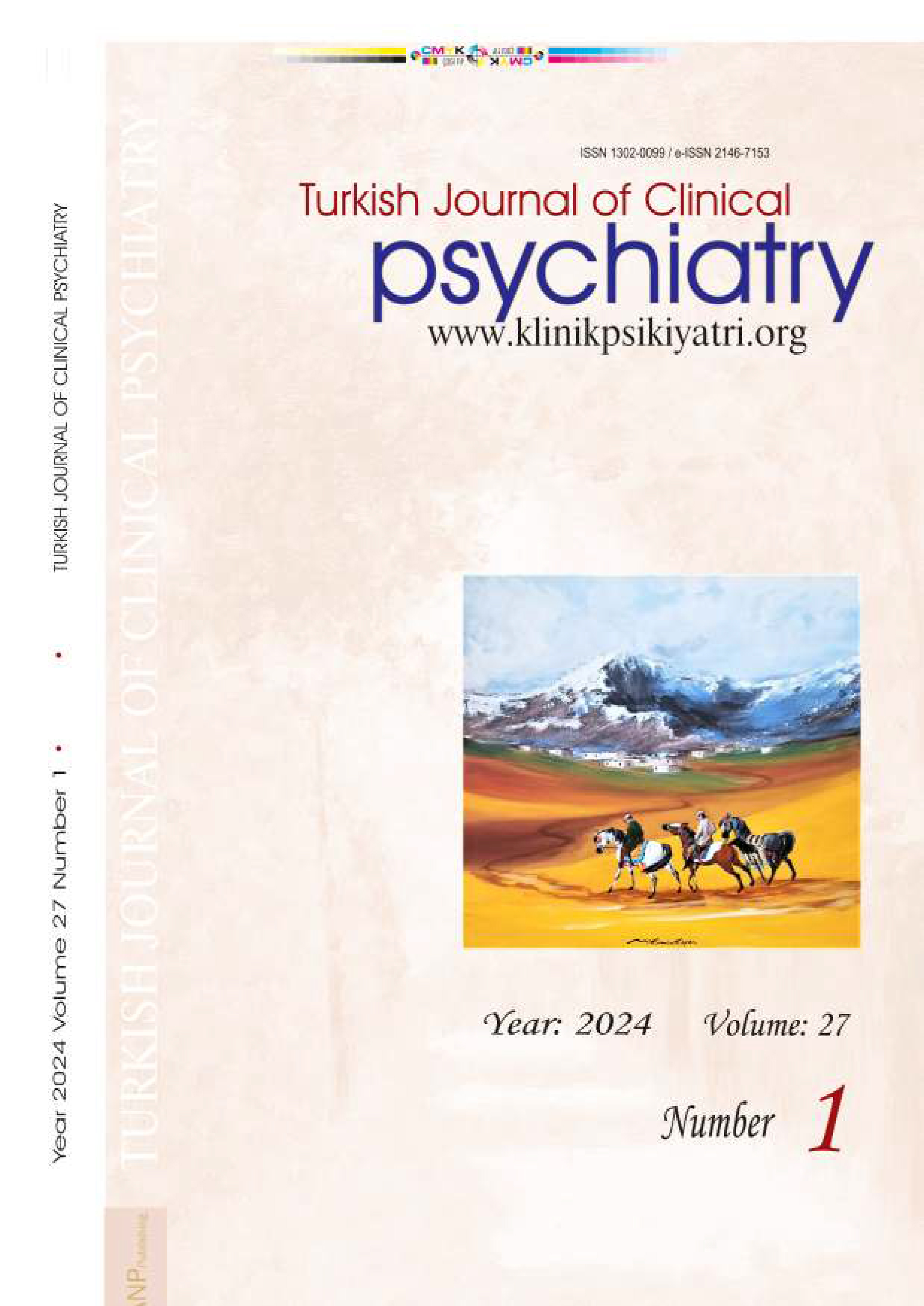





Relationship Between Unlike Grow up Conditions and Alexithymia, Depression, Psychopathology
Deniz Erden1Tpsk. Dr., Balıkesir Asker Hastanesi Psikiyatri Kliniği, BalıkesirObjective: The aim of this study is to compare adolescents who grew up in orphanage with adolescents who grew up in their families in terms of alexithymia, depression and psychopathology. The second aim is to investigate relationship between alexithymia and depression, pyschopathology was determined for the both groups. Method: The research included n=30 adolescents who grew up in orphanage and n=30 adolescent who grew up in their families,ages between 17-18. For the evaluation purpose the Toronto Alexithymia scale ( TAS), Beck depression scale and SCL-90 R scale were administered. The data were analyzed using t- test for independent groups, pearson moments correlations, linear regression analysis. Results: Significant differences was found between alexithymia and depression mean score of the two groups. While there was a meaningful relationship at p<0.01 level between alexithmia and depression scores in the first group. This kind of relationship was not observed in adolescents group who grew up in their families. Depression variable was found to be significantly contributing to the prediction of alexithymia score in the first group. In term of psychopathology there was not a meaningful difference however the mean values were turned out to be higher for the both groups. In addition depression scores were found significant correlation with psychopathology for the two groups. Conclusion: Adolescents who grew up in orphanage are more alexithymic and depression than others. Depression has a close relationship to alexithymia in this group.There wasnt found relationship between alexithymia and psychopathology for both groups.
Keywords: Key Words: Alexithymia, depression, psychopathology, Toronto alexithymia scale, SCL-90 R, Beck depression scale.
Farklı Yetişme Koşullarının Aleksitimi, Depresyon ve Psikiyatrik Belirtilerle İlişkisi
Deniz Erden1Tpsk. Dr., Balıkesir Asker Hastanesi Psikiyatri Kliniği, BalıkesirAmaç: Çalışmanın amacı çocukluk çağından itibaren ailesinden ayrı yetiştirme yurdunda büyüyen gençler ile ailesinin yanında büyüyen gençleri aleksitimi, depresyon ve psikiyatrik belirtisellik açısından karşılaştırmak, her iki grupta aleksitimi ile depresyon, psikiyatrik belirtisellik arasındaki ilişkiyi incelemektir. Yöntem: Araştırmaya yetiştirme yurdunda büyüyen (n=30), ailesinin yanında büyüyen (n=30), yaşları 17-18 arasında bulunan gençler katılmıştır. Değerlendirme amacıyla Toronto Aleksitimi ölçeği (TAS ), Beck Depresyon ölçeği ve SCL-90 R ölçekleri kullanılmıştır. Verilerin analizinde bağımsız gruplar için t-testi, korelasyon ve regresyon analizi teknikleri kullanılmıştır. Bulgular: Verilerin analizi sonucunda: yetiştirme yurdunda büyüyen gençler ile ailesinin yanında büyüyen gençlerin aleksitimi ve depresyon puan ortalamaları arasında anlamlı farklılık bulunmuştur. Yetiştirme yurdunda büyüyen gençlerin aleksitimi puanları ile depresyon puanları arasında p<0.01 düzeyinde anlamlı ilişki bulunurken ailesinin yanında büyüyen gençlerde bu iki değişken arasında ilişki bulunamamıştır. Yetiştirme yurdunda büyüyen gençler grubunda depresyonun aleksitimi puanlarını yordamada anlamlı katkısının olduğu bulunmuştur. Her iki grupta gençlerin psikiyatrik belirtisellik açısından farklılık göstermediği ancak grup ortalamalarının yüksek olduğu saptanmıştır. Her iki grupta depresyon puanları ile psikiyatrik belirtisellik arasında anlamlı korelasyon bulunmuştur. Sonuç: Ailesinden ayrı büyüyen gençler daha fazla aleksitimik ve depresif özellikler göstermektedir. Ailesinden ayrı büyüyen gençlerde aleksitimi ile depresyon puanları arasında anlamlı ilişki bulunmuştur. Her iki grupta aleksitimi ile psikiyatrik belirtisellik arasında ilişki bulunmamıştır.
Anahtar Kelimeler: Anahtar Sözcükler: Aleksitimi, depresyon, psikiyatrik belirtisellik, Toronto aleksitimi ölçeği (TAS), SCL-90 R belirti tarama ölçeği, Beck depresyon ölçeği.
Manuscript Language: English
(3030 downloaded)










